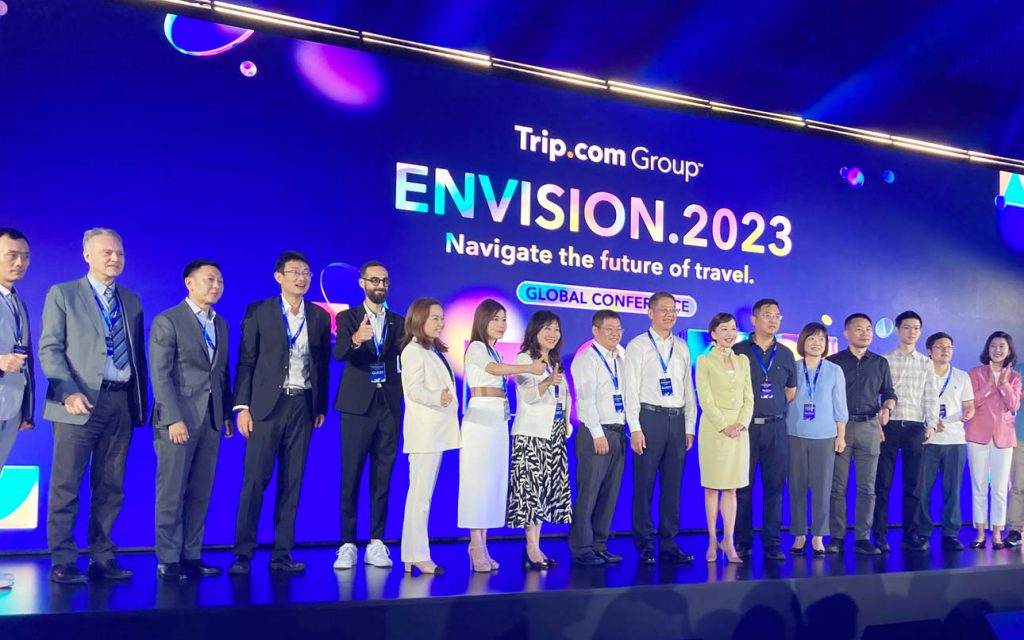Shanghai-based global travel company Trip.com’s vision for the future includes offering space travel on its platform, taking up the call by government to boost inbound tourism and optimising efficiency and convenience for corporate travellers.
- Expected strong demand in China for space travel
- Massive development opportunity in improving travel management content
- Commitment to raising inbound tourism’s GDP contribution for China
Shanghai-based global travel company Trip.com Group’s vision for the future includes offering space travel on its platform, taking up the call by government to boost inbound tourism and optimising efficiency and convenience for corporate travellers.
These brush strokes paint some key aspects of the group’s vision for the future unveiled at its recent Envision.2023 – Navigate the Future of Travel Global Conference, attended by about 700 global industry partners at a venue not far from its headquarter campus in Changning District.

Arguing that travel promotes innovation, chairman James Liang in his video address cited man’s migration out of Africa leading to agriculture, the age of European exploration resulting in astronomy, geometry, evolution and scientific revolution, and space travel possibly leading to “limitless potential”.
Tribes travelling out of Africa helped humanity to survive by “risk diversification,” he continued, and so will “space travel and migration” and man being a “multi-planetary species”.
While the rapid development of metaverse technology could replace the desire to travel, Liang believes it will not because the real universe is “infinitely more complex, interesting and orderly”.
He said: “We love the travel industry because it is uniquely good. Psychologically it is a non-satiable high-level need. Economically, it is a long-term high-growth industry. Socially, it promotes understanding, integration and peace. Philosophically, it helps to achieve a higher purpose of humanity, that is the long-term prosperity of humanity because travel inspires innovation and space migration.
“We feel a sense of mission to help deliver the best travel experience, not in the metaverse universe, but in the real universe”.
Developing space travel and more
Elaborating on the company’s vision for space travel, CEO Jane Sun said it would be developed on the Trip.com platform and she would want to take the lead.
Sharing her optimism on demand for this new travel frontier, Sun said a US$200,000 programme on Trip.com was booked in 17 seconds.
In her Charting the Future of Travel Today address and on the topic of corporate travel, Sun noted there was a 100 per cent increase in successful partnerships and digital transformation in local sales and efficiency in optimising efficiency and convenience.
Trip.com also concluded some 1.5 million global hotel partnerships with international brands and by streamlining its travel management content improved efficiency for partners by 75 per cent, she added.
While it is number one in China, Trip.com also wants to address the business travel experience abroad and Sun sees “investment opportunities”.
She continued: “Our investment strategy is based on three principles. First, only travel-related businesses, second, it has to be the core competence and third we are only after the number one or two in the vertical.
“We are waiting for the right time when the market gives us a good opportunity, and we will invest with discipline like during the financial crisis.”
Promoting China inbound
In answering the call by Weng Huajian, vice mayor, Changning District, People’s Government of Shanghai to work with Trip.com to boost inbound during his welcome address, Sun acknowledged China’s inbound baseline and contribution to GDP was small compared to other Asian destinations.
She commented that inbound tourism represented 13 per cent of Thailand’s GDP and it was between five and seven per cent for Singapore and Japan.
“Inbound tourism is an area with great potential. It only represented 0.5 per cent of China’s GDP in 2019,” she said, adding it would be good for China as it would increase job opportunities for young people and create an initiative to bring prosperity to remote areas in the country.
“There’s a lot of work to do, like visas and the need to make applications more user-friendly like Saudi Arabia or Dubai, which offer online applications and visas-on-arrival.”
Sun observed the government was “making good improvement” like linking overseas credit cards to WeChat for payment, and suggested more bilingual signs as most visitors read English and to equip traffic police with technology.
“Trip.com is already working with partners, the government and like-minded in opening up China and welcoming inbound travellers,” she shared.
Meanwhile, to retain talent and to help pregnant employees, Sun said Trip.com provides free taxi transport.
According to Sun, it takes seven years to build the career of talented PhD women and Trip.com is looking at how it can support employees.
She said the company was setting aside a RMB1 billion (US$137,458,000) fund, and starting this year, RMB10,000 will be given for five years to support employees to have their first and second child.
“I hope other companies can support this initiative and that 10 per cent of businesses do,” she commented.




















